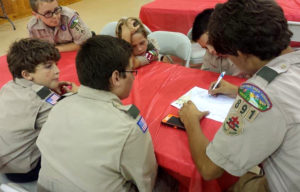Related Advancement
Mentoring develops with every leadership position and requirement. At first, we start leading others as a mentee under the direction of someone with experience. As we gain experience we become the mentor to those who are just beginning their Scouting journeys.
Coaches and Mentors
The terms “coach” and “mentor” are often used interchangeably, but in fact they have distinct differences.
A coach is an individual who develops skills and capabilities in another person or in a group of people (a team). The coach can be another Scout or one of the unit’s leaders. Coaching is a leadership
behavior and skill. Coaching can take the form of discussion, lecture, critique, or guided practice. It is generally ongoing as a youth or a team progresses through the program and is often a “formalized relationship” or a teaching/learning process. The key concept that separates coaching from other leadership styles is letting go and enabling success. As individual capabilities grow, a coach may become a mentor to facilitate continued growth of an individual or stand aside as a team resource.
A mentor is an experienced Scout or adult leader who becomes a trusted guide and counselor to a less experienced individual. This
trusting and caring relationship normally extends beyond Scouting skills into values, beliefs, and feelings. A mentor may be assigned, but often this relationship occurs naturally and is fostered between the individuals involved. Adults often mentor youth in the program, but youth can also mentor each other. In fact, you can even mentor someone your own age or older if you have a skill that person doesn’t have.
Coaching is different from mentoring because the mentoring process is led by the learner and is less skills-based. A good mentoring relationship is identified by the willingness and capability of both parties to ask questions, challenge assumptions, and disagree. The mentor is far less likely to have a direct-line relationship with the mentee, and in a mentoring relationship this distance is desirable. Mentoring is rarely a critical part of an individual’s role, but rather an extra element that rewards the mentor with fresh thinking as well as the opportunity to transfer knowledge and experience (wisdom) to a new generation.
The EDGE method is great for teaching first aid and knot-tying, but it’s also a valuable part of the mentoring process. How could a mentor use EDGE to teach something like leadership or career discernment?
- Explain: The mentor explains how something is done.
- Demonstrate: After the mentor explains, the mentor demonstrates while explaining again.
- Guide: The mentee tries the skill while the mentor guides them through it.
- Enable: The mentee works on their own under the watchful eye of the mentor. The mentor’s role in this step is to remove any obstacles to success, which enables the mentee to succeed.
The Mentor Law – The Scout Law outlines the traits of a good Scout
or Venturer. But what traits does a good mentor have? Here are a few.
 Open-mindedness: Mentors set aside their own priorities, preferences, and prejudices. They are willing to be changed in the mentoring process as much as their mentees are changed.
Open-mindedness: Mentors set aside their own priorities, preferences, and prejudices. They are willing to be changed in the mentoring process as much as their mentees are changed.- Patience: Rather than giving the “right” answers, mentors help their mentees discover those answers on their own. That takes patience.
- Listening ability: Mentors listen more than they talk. Their goal is not to push their mentees in a particular direction so much as to help them find their own path.
- Availability: Mentoring involves building ongoing relationships. Good mentors make time to meet with their mentees.
- Honesty: Mentors, like true friends, tell us what we need to hear, even when we don’t want to hear it.
- Support: Mentors help their menthes find resources they need, whether that’s books, Web resources, classes, or other mentors.
National Mentoring Month was created by the Harvard School of Public Health and MENTOR (the National Mentoring Partnership). It has been held each January since 2002 and has received strong support from Congress and the president of the United States. During National Mentoring Month, consider doing the following things to promote mentoring in Scouting:
- Conduct a Mentoring Tomorrow’s Leaders workshop.
- Recognize recent participants who have completed the practicum experience portion of Mentoring Tomorrow’s Leaders.
- Recognize key mentors in Scouting and the community.
For more information about National Mentoring Month, visit: www.nationalmentoringmonth.org.
